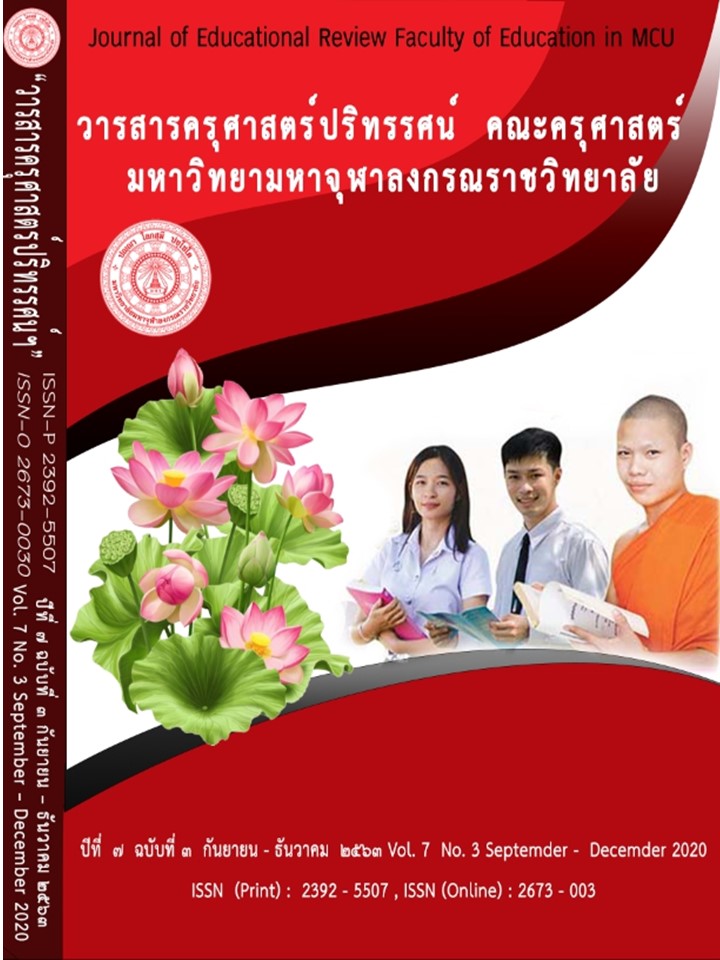DEVELOPMENT OF EFFICTIVE STUDENT AFFAIRS ADMINISTRATION BASED ON SANGAHAVATTHU IV PRINCILES FOR SCHOOLS UNDER OFFICE OF PRIMARY EDUCATION SERVICE AREA
Main Article Content
Abstract
This research paper aimed to propose the development of effective student affairs administration based on Sangahavatthu IV principles for schools under office of Primary Education Service Area. Mixed methods research with 3 steps was designed. Step 1: study the condition of student affairs administration using questionnaires with 400 samples. Step 2: develop effective student affairs administration based on Sangahavatthu IV by interviewing 24 key informants. Step 3: propose the development of effective student affairs administration based on Sangahavatthu IV with focus group discussion of 10 key informants. Research results showed that the development of effective student affairs administration based on Sangahavatthu IV principles for schools under office of Primary Education Service Area consisted of 1) principles, 2) goals, 3) operational systems, and 4) operational processes. It was an effective management of student activities. A systematic process for organizing activities consisted of (1) setting policies and guidelines, (2) supervision and monitoring, (3) promoting and supporting, and (4) assessment and reporting by integrating with the principle of Sangahavatthu IV, which is the connection of kindness, generosity, support and coordination, consisted of (1) Dana is giving generosity and sacrifice, helping sharing of student activities, (2) Piyavaca is kindly speaking to one another, polite and sweet words of student activity, (3) Atthacariya is a benefit, help with the physical strength of student activities, and (4) Samanattata is to heal people with equal treatment of student activities.
Article Details
ทัศนะและความคิดเห็นที่ปรากฏในบทความในวารสารฉบับนี้ถือเป็นความรับผิดชอบของผู้เขียนบทความนั้นเพียงผู้เดียว และไม่ถือเป็นทัศนะและความรับผิดชอบของกองบรรณาธิการ
กองบรรณาธิการขอสงวนสิทธิ์ในการคัดเลือกบทความลงตีพิมพ์และจะแจ้งให้เจ้าของบทความทราบหลังจากผู้ประเมินบทความตรวจอ่านบทความแล้ว
ต้นฉบับที่ได้รับการตีพิมพ์ในวารสารครุศาสตร์ปริทรรศน์ คณะครุศาสตร์ มหาวิทยาลัยมหาจุฬาลงกรณราชวิทยาลัย ถือเป็นกรรมสิทธิ์ของคณะครุศาสตร์ มหาวิทยาลัยมหาจุฬาลงกรณราชวิทยาลัย ห้ามนำข้อความทั้งหมดหรือบางส่วนไปพิมพ์ซ้ำ เว้นเสียแต่ว่าจะได้รับอนุญาตจากมหาวิทยาลัยฯ เป็นลายลักษณ์อักษร
References
กระทรวงศึกษาธิการ. (2551). คู่มือการจัดกิจกรรมพัฒนาผู้เรียน เอกสารประกอบหลักสูตรการศึกษาขั้นพื้นฐาน พุทธศักราช 2551. กรุงเทพมหานคร: กระทรวงศึกษาธิการ.
กระทรวงศึกษาธิการ. (2561). หลักสูตรการศึกษาขั้นพื้นฐาน พุทธศักราช 2551 (ฉบับปรับปรุง 2560). กรุงเทพมหานคร: กระทรวงศึกษาธิการ.
กระทรวงศึกษาธิการ. (2562). พระราชบัญญัติการศึกษาแห่งชาติ พ.ศ. 2562. กรุงเทพมหานคร: โรงพิมพ์คุรุสภา.
ธานินทร์ ศิลป์จารุ. (2552). การวิจัยและวิเคราะห์ข้อมูลทางสถิติด้วย SPSS. พิมพ์ครั้งที่ 10. กรุงเทพมหานคร: บิสซิเนสอาร์แอนด์ดี.
บุญเรือง กันกรด, (2556). รูปแบบการบริหารกิจกรรมจิตสาธารณะในโรงเรียนเขตพื้นที่การศึกษามัธยมศึกษา. ดุษฎีนิพนธ์ศึกษาศาสตรดุษฎีบัณฑิต. มหาวิทยาลัยนเรศวร.
พระพรหมคุณาภรณ์ (ป. อ. ปยุตฺโต). (2550). ธรรมนูญชีวิต. กรุงเทพมหานคร: พิมพ์สวย.
มหาวิทยาลัยจุฬาลงกรณราชวิทยาลัย. (2539). พระไตรปิฎกฉบับภาษาไทย ฉบับจุฬาลงกรณราชวิทยาลัย. กรุงเทพมหานคร: โรงพิมพ์มหาจุฬาลงกรณราชวิทยาลัย.
สำนักวิชาการและมาตรฐานการศึกษา. (2553). แนวทางการจัดกิจกรรมพัฒนาผู้เรียนตามหลักสูตรแกนกลางการศึกษาขั้นพื้นฐาน พุทธศักราช 2551. พิมพ์ครั้งที่ 2. กรุงเทพมหานคร: โรงพิมพ์ชุมนุมสหกรณ์การเกษตรแห่งประเทศไทย.
อรสา ทรงศรี. (2557). รูปแบบการบริหารกิจการนักเรียนแบบมีส่วนร่วมของโรงเรียนมัธยมศึกษา สังกัดสำนักงานเขตพื้นที่การศึกษามัธยมศึกษา. ดุษฎีนิพนธ์ศึกษาศาสตรดุษฎีบัณฑิต. มหาวิทยาลัยนอร์ทกรุงเทพ.
Lethwood, K.,Leonard, L and Sharratt, L. (1998). Conditions Fostering Organizational Learning in School. Education Administration Quarterly. 34. 243-276


